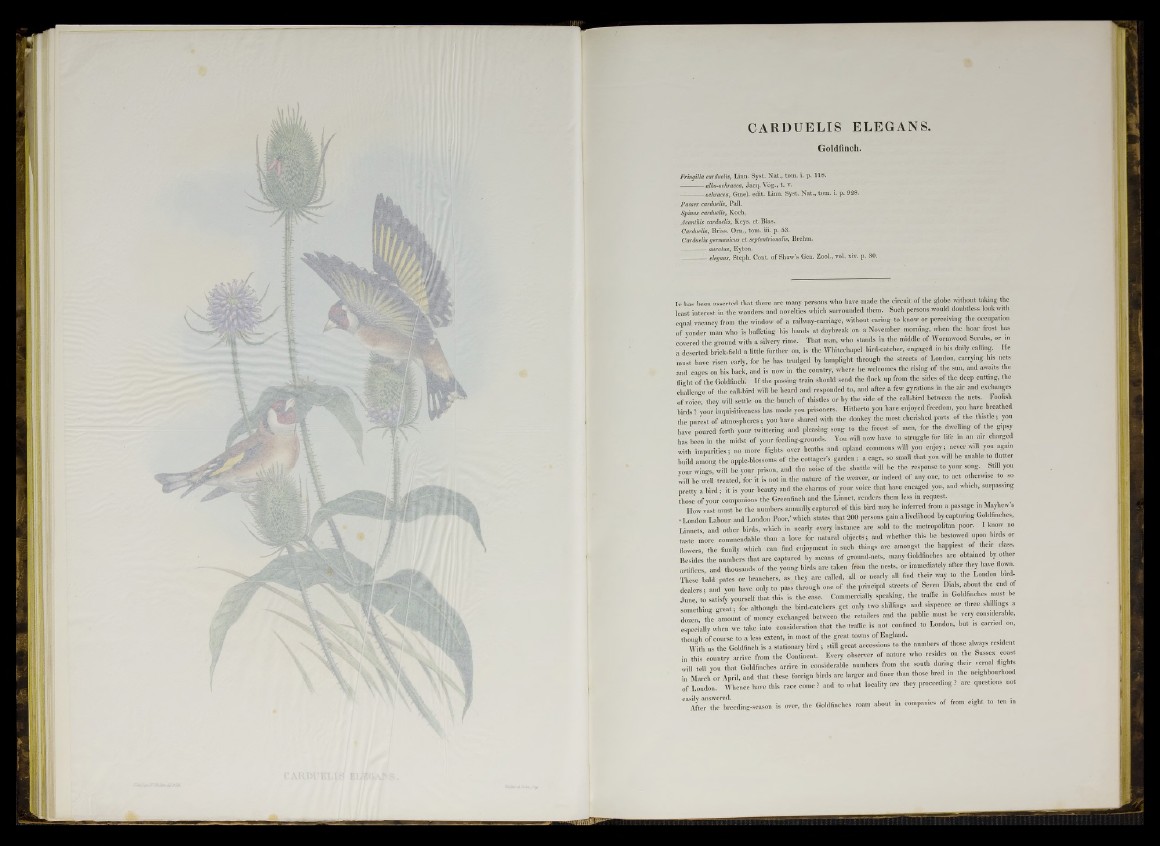
CARDUEUÖ
CARDUELIS ELEGANS.
Goldfinch.
Fringilla carduelis, Linn. Syst. Nat., tom. i. p. 118.
-------- albo-ochracea, Jacq. Vög., t. v.
ochracea, Gmel. edit. Linn. Syst. Nat., tom. i. p. 928.
Passer carduelis, Pall.
Spinus carduelis, Kocb.
Acanthis carduelis, Keys, et Bias.
Carduelis, Briss. Om., tom. iii. p. 53.
Carduelis germanicus et septentrionalis, Brehm.
----------- auratus, Eyton.
— elegans, Steph. Cont. of Shaw’s Gen. Zool., vol. xiv. p. 30.
It has been asserted that there are many persons who have made the cirenit of the globe withont takmg the
least interest in the wonders and novelties which surrounded them. Such persons would doubtless look with
equal vacancy from the window of a railway-carriage, without caring to know or perceiving the occupation
of yonder man who is buffeting his hands at daybreak on a November morning, when the hoar frost has
covered the ground with a silvery rime. That man, who stands in the middle of Wormwood Scrubs, or m
a deserted brick-field a little further on, is the Whitechapel bird-catcher, engaged in his da.ly calhng. He
must have risen early, for he has trudged by lamplight through the streets of London, carrying his nets
and cages on his back, and is now in the country, where he welcomes the rising of the sun, and awaits the
flight of the Goldfinch. If the passing train should send the flock up from the sides of the deep cutting, the
challenge of the call-bird will be heard and responded to, and after a few gyrations in the air and exchanges
of voice they will settle on the bunch of thistles or by the side of the call-bird between the nets. Foolish
birds 1 your inquisitiveness has made you prisoners. Hitherto you have enjoyed freedom, you have breathed
the purest of atmospheres; you have shared with the donkey the most cherished parts of the thistle; you
have poured forth your twittering and pleasing song to the freest of men, for the dwelling of the gipsy
has been in the midst of your feeding-grounds. You will now have to struggle for life in an air charged
with impurities; no more flights over heaths and upland commons will you enjoy; never wi 1 you again
build among the apple-blossoms of the cottager’s garden: a cage, so small that you will be unable to flutter
your wings, will be your prison, and the noise of the shuttle will be the response to your song. Still you
will be well treated, for it is not in the nature of the weaver, or indeed of any one, to act otherwise to so
pretty a bird ; it is your beauty and the charms of your voice that have encaged you, and which, surpassing
those of your companions the Greenfinch and the Linnet, renders them less in request. —
How vast must be the numbers anuually captured of this bird maybe inferred from a passage in Mayhew s
• London Labour and London Poor,' which states that 200 persons gain a livelihood by capturing Goldfinches,
Linnets, and other birds, which in nearly every instance are sold to the metropolitan poor. I know no
taste more commendable than a love for natural objects; and whether this be bestowed upon birds or
flowers the family which can find enjoyment in such things are amongst the happiest of their class.
Besides the numbers that are captured by means of ground-nets, many Goldfinches are obtained by other
artifices, and thousands of the young birds are taken from the nests, or immediately after they have flown.
These bald pates or branchers, as they are called, all or nearly all find their way to the London b.rd-
dealers; and you have only to pass through one of the principal streets of Seven D.aU about the end of
June to satisfy yourself that this is the case. Commercially speaking, the traffic in Goldfinches must be
something great; for although the bird-catchers get only two shillings and sixpence or three shillings a
dozen the amount of money exchanged between the retailers and the public must be very considerable,
especially when we take into consideration that the traffic is not confined to London, but is carried on,
though of course to a less extent, in most of the gi-eat towns of England. , . , H
With us the Goldfinch is a stationary bird ; still great accessions to the numbers of those always resident
in this country arrive from the Continent. Every observer of nature who resides on the Sussex coast
will tell you that Goldfinches arrive in considerable numbers from the south during their vernal flights
in March or April, and that these foreign birds are larger and finer than those bred g the neighbourhood
of London. Whence have this race come ? and to what locality are they proceeding ? are questions not
631AftTuTtoeeding-aeason is over, the Goldfinches roam about in companies of from eight to ten in